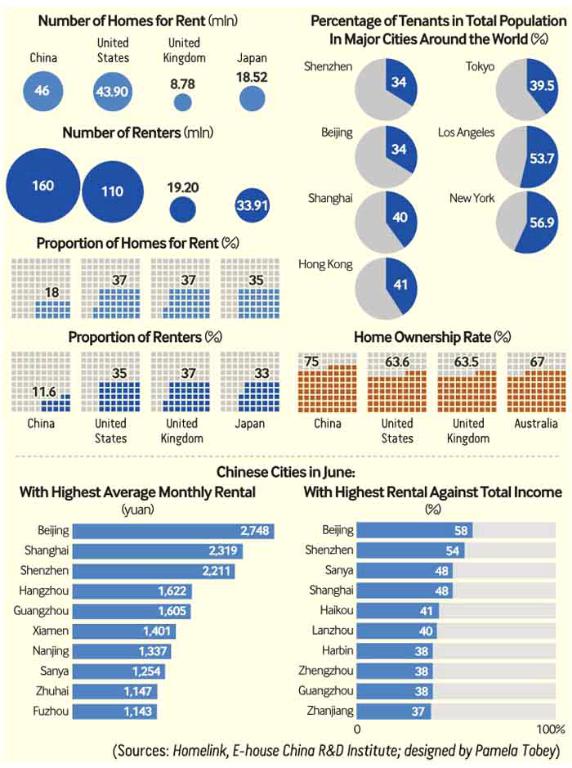A Boost to Renting
2017-09-29ByWangJun
By+Wang+Jun
China will launch a pilot program in 13 major cities, including Beijing, Shanghai and Guangzhou, to build rental housing on rural land in an attempt to increase rental housing supply, the authorities announced on August 28.
Nanjing, the capital city of east Chinas Jiangsu Province, has become the second city in China after Guangzhou to grant equal rights to home renters and buyers, according to an announcement from the local government on August 18.
On the previous day, the municipal government of Beijing started soliciting public opinion on a similar policy.
The moves are part of the latest government efforts to boost the leasing market. On July 20, nine ministerial departments jointly launched a pilot program in 12 cities with net population infl ows—Guangzhou, Shenzhen, Nanjing, Hangzhou, Xiamen, Wuhan, Chengdu, Shenyang, Hefei, Zhengzhou, Foshan and Zhaoqing.
These cities are required to encourage both home leases and purchases and to provide multiple housing supply channels to residents who do not buy their own homes.
Underdeveloped leasing market
According to a report from real estate broker Homelink, 160 million Chinese people now live in rented homes in cities, accounting for 11.6 percent of the total population. Most of the tenants are university graduates of the current year and migrant workers. In the era of high housing prices, the supply of rented homes far from satisfi es demand and is accompanied by other problems including high rent and poor condition of rented homes.
In Beijing, Shanghai and Guangzhou, people spend an average of more than 2,000 yuan ($300.3) per month on rent, according to a report issued by Shanghai-based E-House China R&D Institute, which collects data to calculate the ratios of rental against income in 50 major Chinese cities.
In June, rent accounted for 25-45 percent of tenants incomes in 34 cities such as Xiamen, Hangzhou and Hefei. In Beijing, Shanghai and Shenzhen, the maximum ratio even surpassed 45 percent.
Liu Hongyu, head of the Institute of Real Estate Studies under Tsinghua University, said that in order to develop the leasing market, the government must change the supply structure and keep increasing the supply to curb the continuous growth of rental costs.
Song Ding, head of the Tourism and Real Estate Industry Research Center of the China Development Institute, told Shanxi Evening News that the problems in Chinas residential leasing market exist mainly because the market received inadequate attention as opposed to the sales market.endprint
The crux of the problem lies in inadequate supplies, Li Yujia, a research fellow with Shenzhen Real Estate Research Center, wrote in a commentary published in National Business Daily.
“Since local governments only focus on controlling the housing purchase market, the leasing market has grown disorderly, with insuffi cient supply. Moreover, home renters cannot enjoy the same basic public services as homeowners,” Liu said.
Solutions
On July 17, Guangzhou decided to give tenants and homeowners equal rights to local education resources.
After that, the cities of Wuxi, Zhengzhou and Jinan acknowledged rented homes as “legal and stable residences,” and allowed tenants to get hukou—household registration.
“Granting more rights to home renters has become a trend in many major cities in formulating home leasing policies and has become an important step in nurturing the leasing market,” Liu said.
Encouraging the establishment of more professional house renting corporations is also important for the development of the rental market in the 12 pilot cities.
Among the 100 million homes being rented out in China, more than 90 percent are provided by individual owners, while less than 2 percent are offered by professional apartment operators. In developed countries, however, 20-30 percent of rented apartments are run by professional operators, according to a report by the Shanghai Apartment Operators Alliance.
To address the problem, Shenyang vowed to have at least 50 corporations engaged in the home renting business by 2020; and Wuhan required its two economic development zones to provide 7,000 rooms for rent and establish at least 20 house rental businesses.
State-owned capital is particularly encouraged to enter the leasing market. For example, Chengdu will establish three to four state-owned rental companies by the end of this year; and Xiamen decided to support its state-owned enterprises (SOEs) in investing more in that market.
Yang Xianling, a researcher with Homelink, said SOEs can play a bigger role in the home rental market and help stabilize the sector.
“Moreover, engaging in the house leasing business will help SOEs reuse their idle buildings and increase rental housing supplies,” Yang wrote in a research note.
Song said the pilot program in 12 cities and actions by other cities to develop the market, especially the move to grant equal rights to tenants and homeowners, will be of great signifi cance to carrying out the countrys decision to put in place a long-term mechanism which encourages both renting and purchasing.endprint
Impact on housing price
Some people are concerned whether housing prices will drop sharply after the pro-renting policies are implemented.
“Each year Guangzhou receives more than 200,000 university graduates whose hometowns are not in the city, together with 300,000 university graduates with household registrations in Guangzhou,” Wang Shao, President of the Guangdong Real Estate Industrial Association, said.
Most of these new university graduates need to rent a home. Wang believes that those who rent houses will still buy their own homes once they can afford to do so.
Sun Bushu, Deputy Director of South China City Research Association, said that since homes are a type of property, people will still purchase them for the purpose of maintaining and increasing the value of their assets.
“Therefore boosting the leasing market will not lead to any signifi cant drop in housing prices, but will help stabilize prices,” Sun predicted. endprint
endprint
